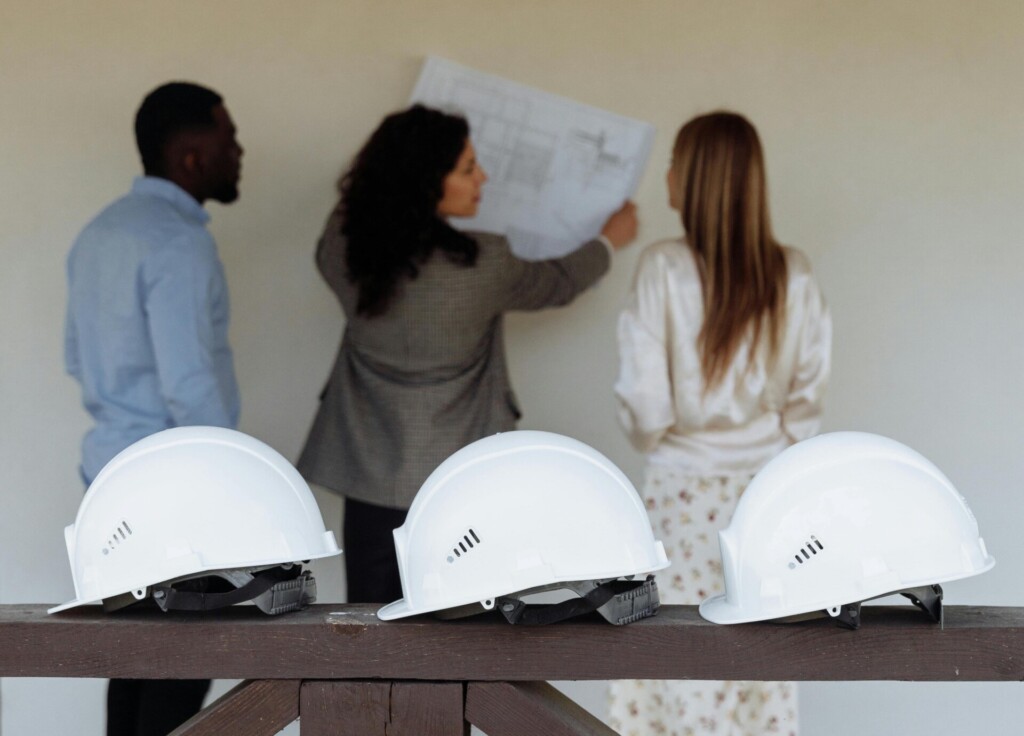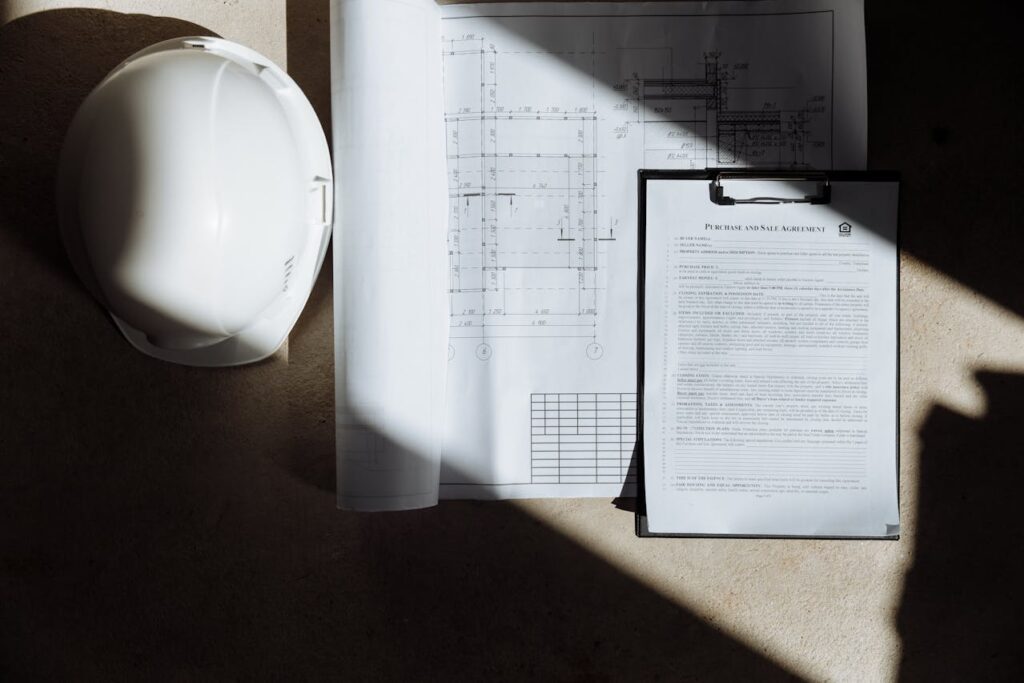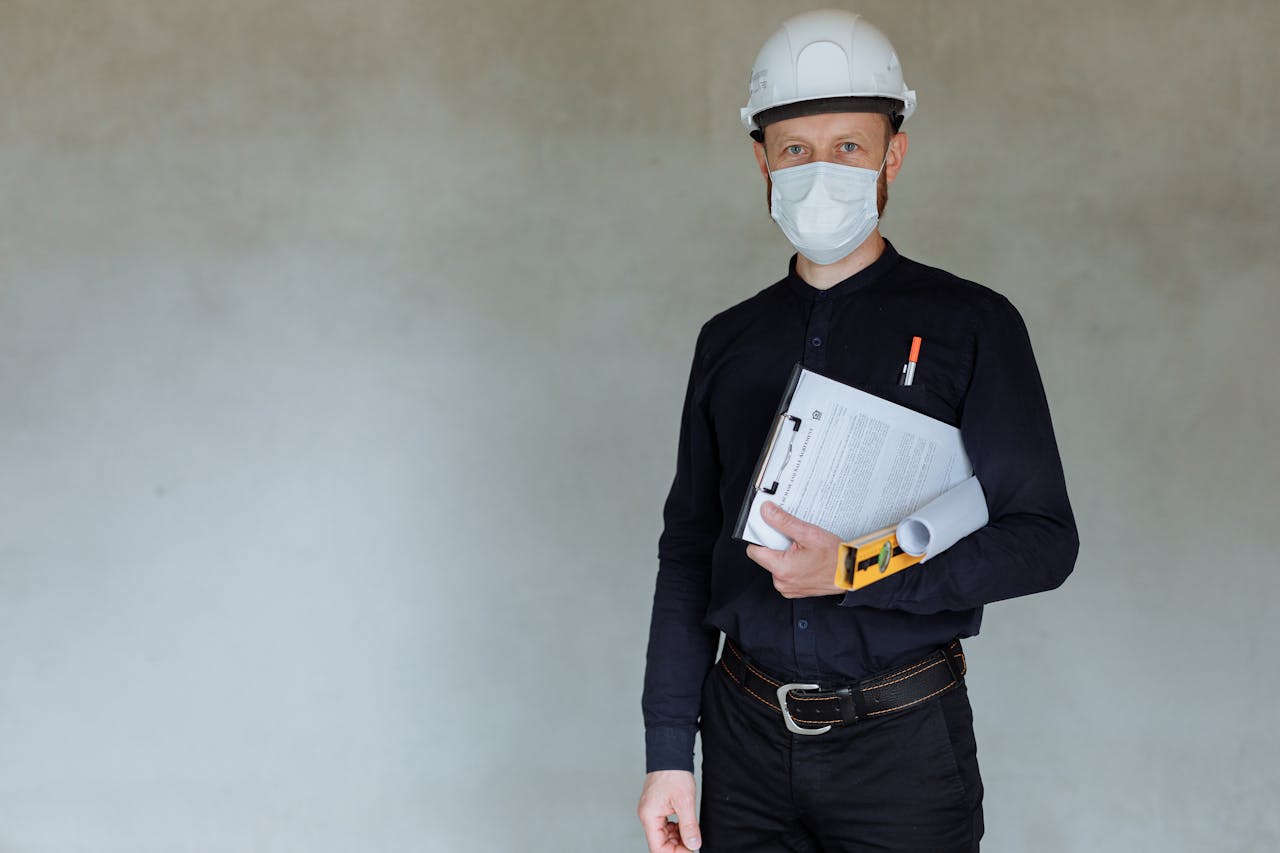A standard commercial construction project in Houston typically requires 12 to 18 months from groundbreaking to occupancy for buildings between 5,000 and 50,000 square feet. This timeline extends significantly for larger developments, with high-rise projects commonly spanning 22 to 28 months due to their complex vertical systems and specialized construction requirements.
Houston’s unique conditions directly impact these schedules. The city’s permitting processes through the Houston Permitting Center and Commercial Plan Review system add structured timeframes that we factor into every project timeline. Additionally, Houston’s climate presents seasonal challenges that can extend construction by 2 to 4 months, particularly during hurricane season and periods of intense summer heat that affect concrete curing and worker productivity.
What Are The Core Phases Of A Houston Commercial Build, And How Long Do They Take?

Commercial construction in Houston follows a structured sequence that we organize around six essential phases. Each phase has distinct objectives and time requirements that build toward project completion.
Concept And Design Phase
Initial design development typically spans weeks to several months depending on building complexity. We coordinate with architects and engineers to refine concepts into detailed construction documents. Simple warehouse conversions may require minimal design time, while custom office buildings with specialized systems need extensive planning.
This phase includes architectural design, structural engineering assessments, and MEP system planning. We provide constructability reviews and preliminary cost estimates during design development to prevent costly revisions later.
Planning And Approvals Phase
Planning and regulatory approval processes generally take 1 to 3 months for most commercial projects. This timeframe covers zoning reviews, site plan submissions, and permit applications. Complex developments with special use requirements or environmental assessments can extend this phase significantly.
We coordinate early with Houston’s permitting offices to understand specific requirements and submission deadlines. Healthcare facilities and high-rise construction typically face more extensive review processes than standard commercial structures.
Pre-Construction Preparation And Sitework
Site preparation and earthwork activities require 1 to 2 months for most projects. This phase begins with site clearing, grading, and establishing proper drainage conditions. Excavation follows for below-grade structures and foundation installation.
We coordinate utility installation alongside foundation work to maximize efficiency. Underground electrical service, water and sewer connections, and storm drainage systems are installed during this phase. Soil conditions and existing site constraints can affect these timelines.
Structural Development Phase
Structural work typically takes 3 to 6 months and represents the most visible construction milestone. Steel frame buildings generally complete structural erection in 4 to 6 weeks, while concrete structures require additional time for forming, pouring, and curing between floors.
During structural construction, we begin preliminary MEP rough-ins for multi-story buildings. Framing establishes the building skeleton, followed by roofing installation to protect interior work from Houston’s weather conditions. This phase demands precise coordination between trades to prevent conflicts.
Interior And Exterior Finishing
Finishing work runs 2 to 4 months and transforms the enclosed structure into functional commercial space. We install building envelope components including exterior walls, windows, and doors before beginning interior systems.
HVAC, electrical, and plumbing rough-ins occur simultaneously with envelope completion. Interior finishing includes insulation installation, drywall, flooring, and architectural details that meet design specifications. This phase requires the highest level of trade coordination.
Final Inspections And Project Handover
Final inspections, punch list completion, and project handover typically take 1 to 2 months. Authority inspections verify code compliance throughout construction, with final inspections confirming project readiness for occupancy.
We maintain detailed punch lists to address outstanding items systematically. System commissioning validates that HVAC, electrical, and plumbing systems operate as designed. Project closeout activities, including warranty documentation and as-built drawings, complete within weeks of certificate of occupancy approval.
| Phase | Duration (Months) |
| Concept and Design | Weeks to months (varies by complexity) |
| Planning and Approvals | 1 – 3 months |
| Pre-Construction Preparation and Sitework | 1 – 2 months |
| Structural Development | 3 – 6 months |
| Interior and Exterior Finishing | 2 – 4 months |
| Final Inspections and Project Handover | 1 – 2 months |
These phase durations align with total project timelines of 12 to 18 months for mid-size buildings when coordination flows smoothly. Weather delays, permitting backlogs, or scope changes can extend individual phases and affect overall completion schedules.
How Do Houston Land Development And Permitting Steps Affect The Schedule?
Houston’s regulatory framework requires completing three sequential steps before construction permits can be issued. We coordinate platting through the Houston Planning Commission, followed by Site Plan Review at the Houston Permitting Center, and finally Commercial Plan Review through Houston Public Works. Each stage has specific documentation requirements and review windows that directly impact project schedules.
Platting And Planning Commission Review
The Houston Planning Commission operates under Chapter 42 of the City Code and must approve or disapprove plats within 30 days of complete submittal. State law mandates this timeline, creating predictable scheduling for project teams. If the Commission fails to act within 30 days, applications automatically receive approval.
We submit plat applications through the Plat Tracker online system, which provides real-time status updates and streamlines communication with planning staff. The Commission meets biweekly on Thursdays at 2:30 p.m., and deferred applications must still receive final action within the statutory 30-day period. This consistent schedule allows us to plan construction phases around known approval dates.
Site Plan Review Requirements
Site Plan Review takes place at the Houston Permit Center and evaluates compliance across multiple city ordinances. We coordinate reviews for off-street parking requirements under Chapter 26, which establish minimum parking ratios based on building use and square footage. Chapter 33 governs landscaping and tree preservation standards that affect site layout and construction sequencing.
Access agreements under Chapter 10.8 require review of driveway connections and shared access arrangements. Sidewalk requirements vary by street classification, and the Residential Buffering Ordinance applies additional screening requirements for projects adjacent to residential areas. We use the Site Plan Process Flow Chart available through the Houston Permit Center to track each review component and ensure complete submittals.
Commercial Plan Review
Commercial Plan Review represents the final technical review before Building Code Enforcement issues construction permits. We submit all documentation through ProjectDox, Houston’s electronic plan review system, which requires specific file formats and naming conventions.
Critical submittal documents include a complete COMcheck energy compliance report, utility availability letters from Taps & Meters, property surveys, and comprehensive MEP plans with engineer seals. The COMcheck report became a mandatory requirement in 2016, and incomplete reports face automatic rejection at pre-screen as of April 2021. We coordinate early with mechanical, electrical, and plumbing consultants to ensure these drawings meet city standards before submittal.
Traffic Form OCE-0001 applies to projects affecting vehicular circulation or parking demand. We evaluate whether developments require traffic studies or mitigation measures based on expected usage patterns and coordinate these requirements during the design phase.
Typical Permit Review Windows
Local permit approval windows vary significantly by project type and submittal quality. Build-out permits typically process within 3-6 weeks for straightforward tenant improvements with minimal MEP modifications. Ground-up commercial construction generally requires 8-10 weeks for complete plan review across all city departments.
However, permitting can extend to 1-3 months when applications face backlogs or require multiple review cycles. Incomplete MEP submittals represent the most common delay factor in Houston, often requiring complete resubmittals that reset the review timeline. We work closely with Taps & Meters at 832.394.8888 early in the design process to secure utility availability confirmation before formal submittal.
The Planning Department’s Subdivisions Section at 832.394.8849 handles development plat reviews that must be completed before Commercial Plan Review. We recommend completing both subdivision compliance verification and utility capacity confirmation as prerequisite steps to prevent delays during building permit review.
Which Factors Most Often Delay A Houston Commercial Construction Timeline?

Size and scope drive the biggest delays in Houston commercial projects. Large buildings with complex MEP systems require extensive coordination phases that can extend schedules by months. We see this frequently with projects exceeding 50,000 square feet, where mechanical, electrical, and plumbing coordination becomes increasingly intricate as building systems interact across multiple floors and zones.
Construction methods significantly influence delivery speed. Tilt-wall panels and prefabricated systems can accelerate schedules by allowing simultaneous site preparation and component fabrication. Projects using conventional stick-built methods typically require sequential construction phases, while prefabrication enables parallel workflows that compress overall timelines by 15-20%.
Permitting And Submittal Issues
Permitting backlogs create substantial delays when Houston’s review departments face high application volumes. Incomplete submittals compound these delays by resetting review cycles entirely. We often encounter projects delayed 4-8 weeks due to missing COMcheck reports or inadequate MEP drawings in ProjectDox submissions.
Trade availability represents another critical bottleneck. Houston’s construction boom has created intense competition for skilled electricians, plumbers, and HVAC technicians. Projects can face 2-6 week delays waiting for qualified trades to become available, particularly during peak construction seasons from September through April.
Weather And Environmental Factors
Houston weather creates predictable seasonal challenges that extend project timelines. Hurricane season from June through November can halt outdoor work for days or weeks. Heavy rainfall and flooding, common throughout spring and summer, frequently delay concrete pours, sitework, and roofing activities by 2-4 months annually according to recent industry studies.
Extreme heat during summer months forces modified work schedules to protect worker safety. OSHA requirements for heat exposure can reduce productive hours and slow progress on exterior work, adding weeks to structural and envelope phases.
Scope Changes And Site Conditions
Owner-driven scope changes create cascading schedule impacts. Design modifications during construction require new permits, material orders, and trade coordination. We typically see 3-8 week delays for significant scope changes, with MEP modifications requiring the longest adjustment periods.
Unforeseen site conditions frequently emerge during Houston projects due to the region’s challenging soil conditions and high water table. Soil remediation, unexpected utilities, or drainage issues can extend sitework phases by 2-6 weeks. These delays often trigger subsequent schedule adjustments throughout structural and finishing phases.
Funding pauses represent the most severe delay factor, capable of stopping work entirely. Projects experiencing financing issues or owner cash flow problems can face delays ranging from weeks to months, with some never resuming construction.
How Do Timelines Vary by Building Size, Type, and Interior Build-Outs?
Building size dramatically affects construction duration in Houston. A 10,000 SF light commercial building typically requires 10–14 months from start to finish. Warehouses often fall on the shorter end of this range due to their straightforward structural requirements and minimal MEP systems.
Mid-size commercial buildings represent the bulk of Houston’s construction activity. These projects usually span 12–18 months, depending on their complexity and intended use. Office buildings, retail centers, and mixed-use developments in this category follow predictable construction phases that align well with local permitting windows.
Large-Scale Project Timelines
High-rise construction presents unique challenges that extend timelines significantly. These vertical projects commonly require 22–28 months due to complex MEP systems, elevator installations, and the logistical demands of building upward. Each floor addition multiplies coordination requirements between trades.
For buildings exceeding 100,000 SF, we typically plan for 24–30 months of construction. These large facilities often include sophisticated systems for climate control, fire safety, and structural support that demand extended installation and testing periods. The sheer volume of materials and labor coordination pushes schedules well beyond smaller projects.
Interior Build-Out Variations
Tenant improvement timelines vary considerably based on scope and complexity. Simple office build-outs with basic partitioning and finishes can wrap up in a few weeks. More elaborate spaces requiring custom millwork, specialized lighting, or complex MEP modifications stretch into several months.
| Building Size | Timeline (Months) | Type of Construction |
|---|---|---|
| 10,000 SF Light Commercial | 10–14 | Light Commercial |
| Mid-size Commercial | 12–18 | Office, Retail, Mixed-use |
| High-rise Construction | 22–28 | High-Rise |
| 100,000 SF and above | 24–30 | Large Facility with Complex Systems |
| Simple Office Build-outs | Few Weeks | Interior Build-Out |
| Elaborate Spaces | Several Months | Interior Build-Out |
Local permit timelines support faster interior work. Most tenant improvement permits process within 2–4 weeks in Houston, while build-out approvals typically take 3–6 weeks. This relatively quick turnaround helps businesses minimize downtime between signing leases and opening doors.
Light commercial projects benefit from standardized construction methods and readily available materials. These buildings often use conventional framing, standard electrical systems, and straightforward HVAC installations that trades can complete efficiently without extensive customization.
Factors That Accelerate or Extend Schedules
Construction method selection significantly impacts duration. Tilt-up construction can reduce structural phase timelines by several months compared to traditional stick-frame methods. Prefabricated components also speed assembly, particularly for repetitive elements like wall panels or roof systems.
MEP system complexity serves as a major timeline driver. Buildings requiring specialized ventilation, high-capacity electrical service, or complex plumbing systems need additional coordination time. Medical facilities, restaurants, and manufacturing spaces typically fall into this category.
Warehouse construction often proceeds faster than other building types due to simpler systems and larger, unobstructed work areas. These projects focus primarily on structural completion and basic utilities, allowing trades to work efficiently without navigating tight spaces or intricate details.
Conclusion And Next Steps

Commercial construction timeline planning in Houston requires balancing phased durations with permitting requirements and seasonal weather patterns. We approach each project with the understanding that standard 12–18 month timelines for mid-size buildings can extend to 24–30 months for larger facilities, while tenant improvements often complete within weeks to a few months depending on scope complexity.
Schedule protection starts with early completion of foundational approvals. We prioritize platting and site plan reviews during initial project phases, ensuring compliance with Chapter 26 parking requirements and Chapter 33 landscaping standards before construction mobilization. Complete ProjectDox submissions with verified COMcheck energy reports and current Taps & Meters utility availability letters prevent the common delays from incomplete documentation that Houston Permit Center reviews flag during pre-screening. Scope management becomes critical once permits are secured, as owner-driven changes during construction phases consistently add 2–4 months to project completion dates.
Contact EB3 Construction to coordinate your Houston commercial project through these regulatory requirements and construction phases.




